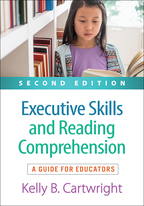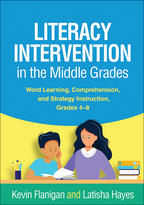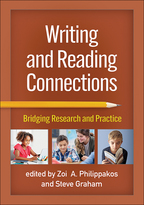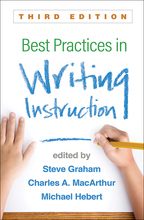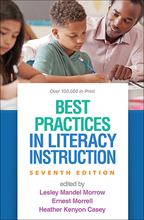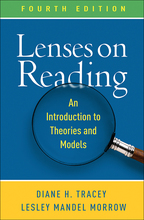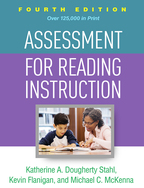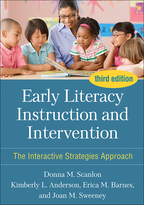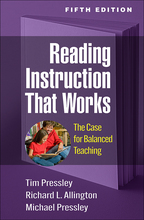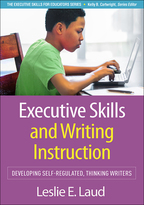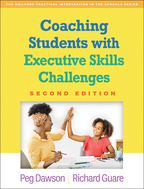Executive Skills and Reading Comprehension
Second Edition
A Guide for Educators
Kelly B. Cartwright
Foreword by Nell K. Duke
HardcoverPaperbacke-bookprint + e-book
Hardcover
orderFebruary 2, 2023
ISBN 9781462551507
Price: $74.00 379 Pages
Size: 7" x 10"
Paperback
orderFebruary 7, 2023
ISBN 9781462551491
Price: $49.00379 Pages
Size: 7" x 10"
e-book
orderJanuary 25, 2023
PDF and Accessible ePub ?
Price: $49.00 379 Pages
ePub is Global Certified Accessible
print + e-book $98.00 $58.80
orderPaperback + e-Book (PDF and Accessible ePub) ?
Price: 379 Pages
ePub is Global Certified Accessible
“As researchers, teachers, and reading specialists, we constantly seek ways to help our striving readers. Cartwright provides practical, accessible, and engaging tools to build readers' executive skills. Equally important, Cartwright deftly and thoroughly builds our understanding of research so we can better understand how executive skills are related to word reading and reading comprehension difficulties. Cartwright's ability to bridge research and practice has made this book a favorite of the future reading specialists in our graduate program!”

—Katherine Hilden, PhD, School of Teacher Education and Leadership, Radford University
“I was excited to discover the first edition of this book, and immediately started implementing the strategies from the Cognitive Flexibility chapter with my students. Subsequently, I was thrilled to learn that the second edition would have an entire chapter dedicated to word recognition and dyslexia. This book gives teachers, tutors, and reading interventionists simple strategies for weaving executive skill work into their current interventions. Speech–language pathologists will gain exciting new tools for supporting students with reading and executive functioning challenges. Cartwright provides specific tasks for improving impulse control, working memory, cognitive flexibility, and more. This second edition is an essential resource for any educator interested in helping students become better readers and thinkers.”

—Carolee Dean, MS, CCC-SLP, CALT, speech–language pathologist and certified academic language therapist, private practice, Midland, Texas
“With a warm and welcoming tone, this book is grounded in real experience in education settings. Cartwright excels in communicating complex research to practitioners in a way that neither oversimplifies nor overwhelms, and that addresses the reader as an active participant. Particular strengths are the book's breadth of coverage, the bridges made between often-siloed areas of research, and the wealth of practical tips and examples. The second edition will be valuable both for scholars who want a comprehensive, engaging overview of this area and for practitioners seeking new ideas for instruction and intervention.”

—Nicola Yuill, PhD, School of Psychology, University of Sussex, United Kingdom
—Katherine Hilden, PhD, School of Teacher Education and Leadership, Radford University
“I was excited to discover the first edition of this book, and immediately started implementing the strategies from the Cognitive Flexibility chapter with my students. Subsequently, I was thrilled to learn that the second edition would have an entire chapter dedicated to word recognition and dyslexia. This book gives teachers, tutors, and reading interventionists simple strategies for weaving executive skill work into their current interventions. Speech–language pathologists will gain exciting new tools for supporting students with reading and executive functioning challenges. Cartwright provides specific tasks for improving impulse control, working memory, cognitive flexibility, and more. This second edition is an essential resource for any educator interested in helping students become better readers and thinkers.”
—Carolee Dean, MS, CCC-SLP, CALT, speech–language pathologist and certified academic language therapist, private practice, Midland, Texas
“With a warm and welcoming tone, this book is grounded in real experience in education settings. Cartwright excels in communicating complex research to practitioners in a way that neither oversimplifies nor overwhelms, and that addresses the reader as an active participant. Particular strengths are the book's breadth of coverage, the bridges made between often-siloed areas of research, and the wealth of practical tips and examples. The second edition will be valuable both for scholars who want a comprehensive, engaging overview of this area and for practitioners seeking new ideas for instruction and intervention.”
—Nicola Yuill, PhD, School of Psychology, University of Sussex, United Kingdom

